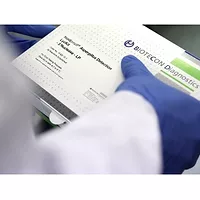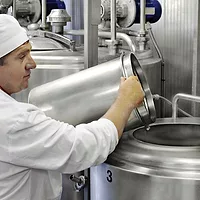Real-Time PCR for Cutting-Edge Food Testing

According to the U.S. Centers for Disease Control and Prevention, foodborne illness is a common, costly—yet preventable—public health problem. Each year, one in six Americans becomes sick by consuming contaminated foods or beverages. Many different disease-causing microbes, or pathogens, can contaminate foods, so there are many different foodborne infections.
Taking the Lead
Bio-Rad has taken a strong lead in this area, providing their full portfolio of pathogen detection systems, including commercial PCR kits and instrumentation, which can provide results in 24 hours. These kits are being used by some of the largest food manufacturers in the world, as well as by third-party testing labs. The assays are very robust, easy to run and have been approved by numerous accrediting bodies in the prepared foods, raw foods and produce industries.
One Bio-Rad partner discovered the advantages of utilizing this broad portfolio in their food testing laboratory: Frontier Fare Testing. This laboratory was established in 2017 by two women in Alaska who had dedicated their lives to public service and safety. Tracy Vacca, MPAS, and Jessica Alexander, MPAS, M.S.C.R.M., are both physician’s assistants with backgrounds in emergency medicine and addiction medicine—each with more than 20 years of experience in patient care and research. Tracy has a degree in nutrition/food chemistry with a special interest in food safety and the development of alternative, plant-based medicines, while Jessica is a clinical laboratory director and has a master’s in clinical research management with a special interest in research and development of cannabinoid-based opiate-replacement therapy. After many years of treating patients with foodborne diseases and opiate addiction, the two were ready to address each problem from a different perspective. Partnering in a laboratory that provides food pathogen testing in Alaska and does R&D for plant-based alternative medicines was a natural fit, and Frontier Fare Testing was born!
“We Couldn’t Ask for a Better Partner”
When asked to describe their company’s partnership with Bio-Rad, they relate that it all began with a comparison of available methods: “[We] contacted Bio-Rad when evaluating methods of testing for the presence of Salmonella and Escherichia coli. It was truly a stroke of luck to have been partnered with Kevin Moore early in the process! We use the word ‘partner’ because he continues to go way above and beyond to help us with acquisition of equipment and supplies, laboratory process development and troubleshooting. As a new lab, this partnership has been invaluable to us. Furthermore, when it came time to set up equipment and learn software and protocols, Bio-Rad sent
Colby Yardley and Kevin Moore to install and train the staff. They did a phenomenal job, and Colby continues to be available to us for remote desktop viewing or even video chat for troubleshooting support. We know that the Bio-Rad team is available to us at any time for consultation, and we trust their input because they will present the facts regarding testing methods and options—even if that means they refer us to a competitor for a consumable or testing method. It’s that level of support that should be considered when signing on with a company long-term as a vendor.”
Frontier Fare Testing chose to start with the Bio-Rad iQ-Check® STEC VirX and Salmonella II kits with the CFX96 Touch® Deep Well Real-Time PCR System. These kits provide screening protocols as part of an environmental monitoring program or Hazard Analysis and Critical Control Points plan and increased efficiency. Challenging matrices are no problem as optimized protocols are available. Up to 96 tests can be run at one time on the multiplex instrument.
“The benefits of using the Bio-Rad PCR system at Frontier Fare Testing are twofold—the simplicity of the system and the continued support,” state Tracy and Jessica. “Protocols for detection of different pathogens are so streamlined and really only vary in media prep steps. Therefore, operator error is minimized, as the protocols are basically the same for all Bio-Rad PCR detection testing. We are now adding Listeria testing to our services, which should be seamless due to the consistency in pathogen protocols. Additionally, the lab uses the base PCR software system with a Bio-Rad thermal cycler and detection system to run a European Aspergillus protocol. The system is easy to adapt for use with alternative protocols, as it is completely intuitive in terms of programming the system.”
As molecular methods for pathogen detection continue to improve, emerging pathogens are being described around the world in molecular terms. The use of real-time PCR methods has the benefits of automation, high sensitivity, high precision and accuracy, and the flexibility to assay for more than one pathogen simultaneously. With these advantages, it is clear that Frontier Fare Testing is well on their way to offering their services to the broader food industry.
www.foodscience.bio-rad.com
Looking for quick answers on food safety topics?
Try Ask FSM, our new smart AI search tool.
Ask FSM →








